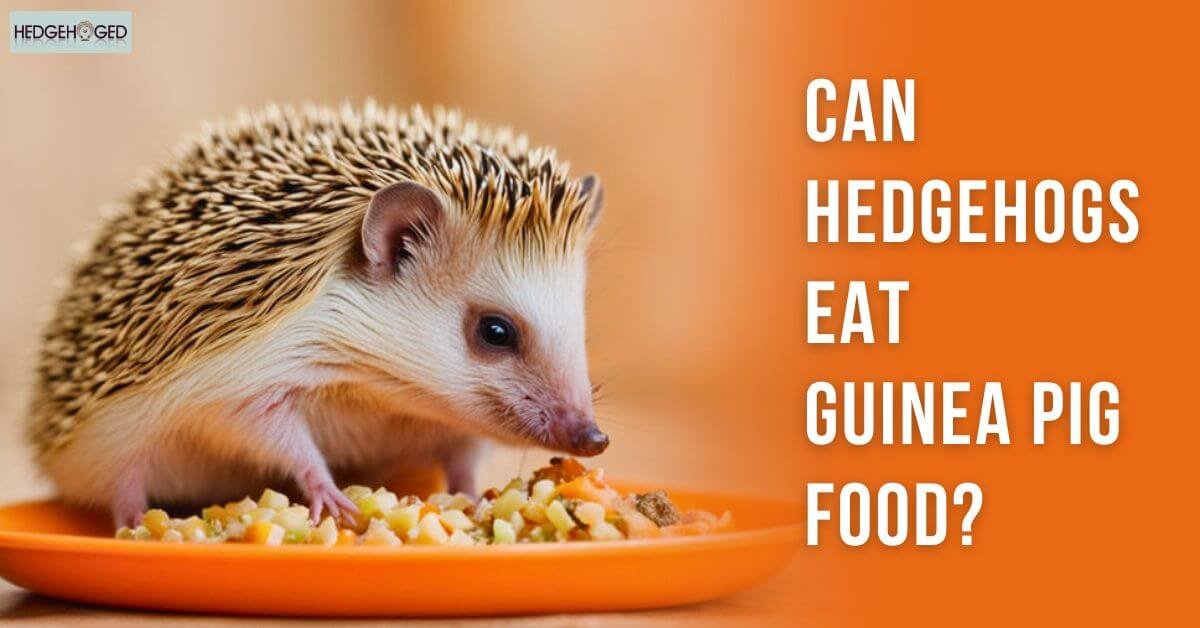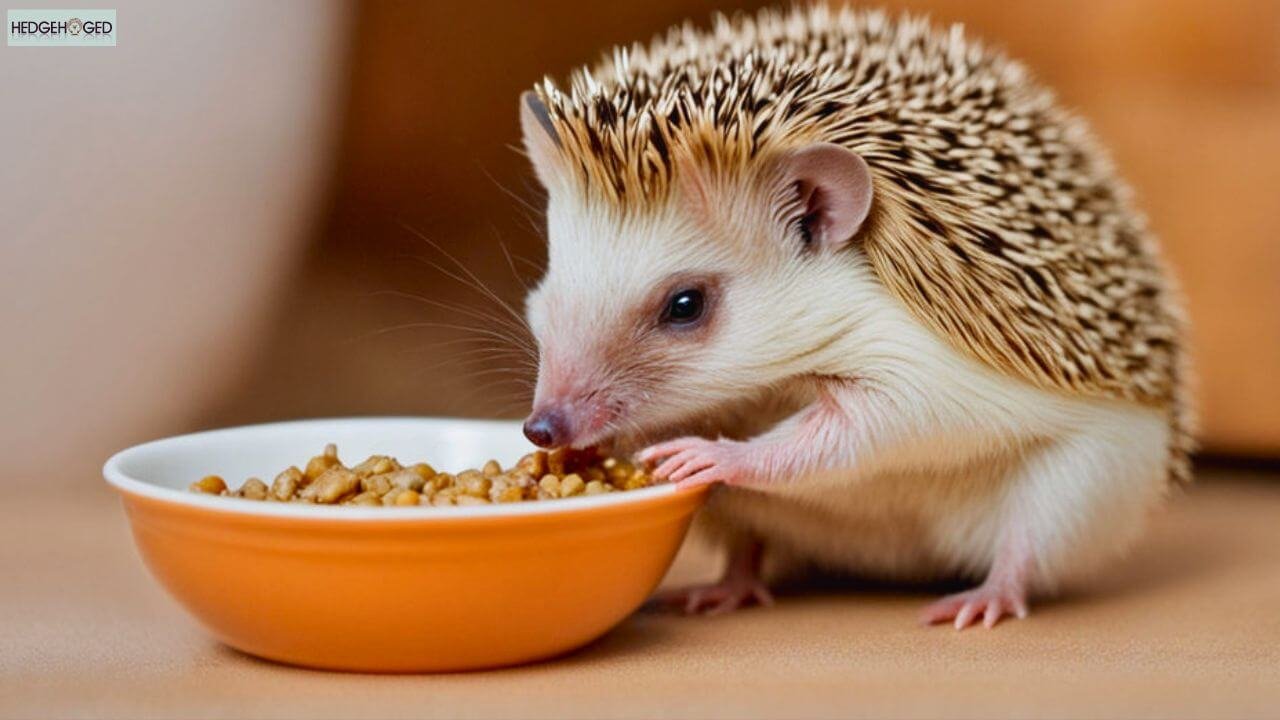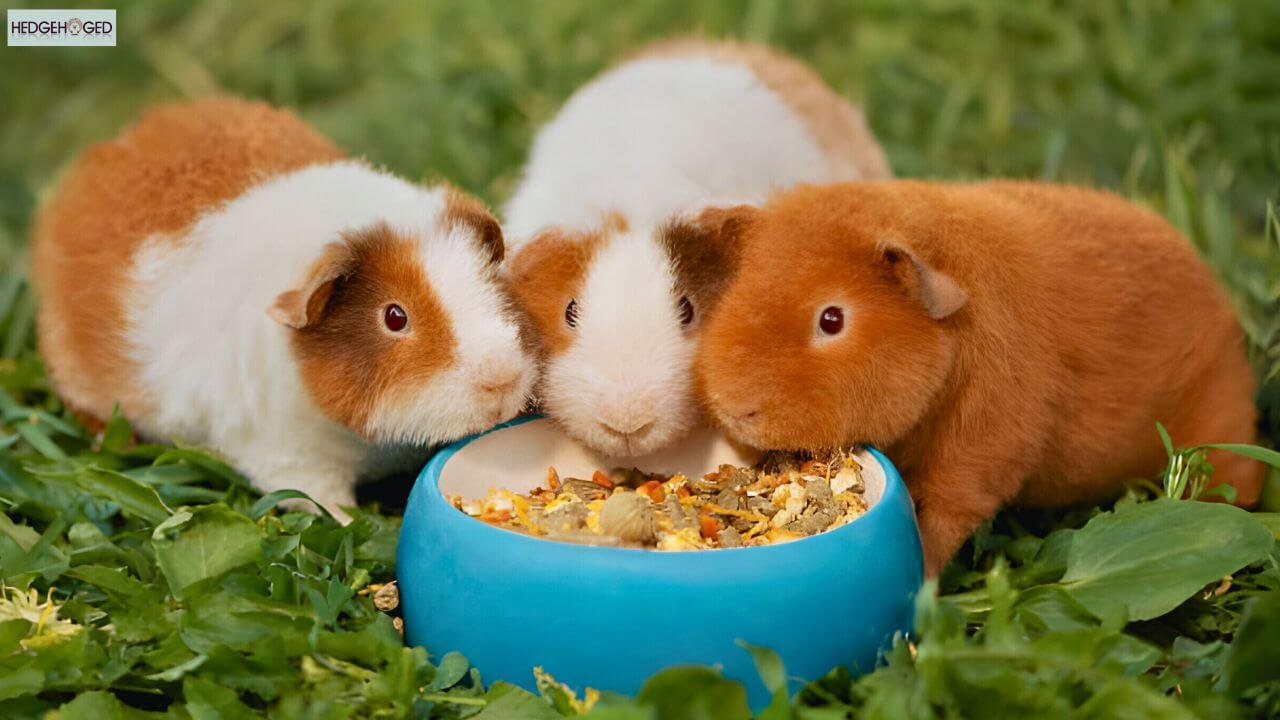Hedgehogs are cute little animals that are also very intelligent and social. Hedgehogs are excellent pets since they enjoy receiving attention and being among other animals.
Even though they are both little pets, hedgehogs and guinea pigs cannot share food. In the wild, guinea pigs consume a broad range of plant materials because they are herbivores.
The majority of hedgehogs are carnivores, eating large insects and small mammals. Certain foods are okay for these spiky mammals to eat, but others should be avoided. However, today will reveal “Can hedgehogs eat guinea pig food?”
The answer to the question is: No, hedgehogs can’t eat guinea pig food. It is essential to comprehend the fundamentals of each animal’s dietary requirements to fully appreciate the differences between different species.
A Little About Guinea Pig
Guinea pigs are gregarious animals with a compact, rounded body form, short legs, and no tail. They arise on the grasslands and lower slopes of South America’s Andes Mountains. Guinea pigs come in a variety of colors and coat lengths. Guinea pigs are herbivores, which means they are designed to eat a plant-based diet and are completely vegetarian.
Guinea pigs have an extremely fragile digestive system and require a high-fiber diet to maintain intestinal motility. Guinea pigs, like humans, are unable to synthesize vitamin C and must take supplements daily to avoid significant health problems.
Guinea pigs naturally consume grasses, plants, vegetables, and crops, which might be tough to recreate at home. Guinea pigs require moderately high fiber levels in their meals, thus supplementing with high-quality fresh hay is essential. Dry diets for guinea pigs should not be heavy in calcium because this can cause urinary tract problems.
What Do Guinea Pigs Eat?
Guinea pigs eat Fresh, cleaned leafy greens or weeds—such as broccoli or kale, which are good sources of Vitamin C every day. Although fruit and root vegetables are not normally consumed by guinea pigs, you can offer them small treats like apple halves or tiny pieces of carrot as a reward.
A wholesome pelleted rodent diet for guinea pigs should have the following ingredients:
- 85–90% of the total amount of unrestricted grazing grass (not grass cuttings) or premium feeding hay (not bedding hay, which could be low in nutrients). As a general rule, give each piggie fresh feeding hay every day that is at least the size of their body.
- Approximately one teacup’s worth of safe leafy greens, veggies, and herbs should be given to each guinea pig each day. Vitamin C-rich vegetables and greens are particularly beneficial.
- One egg cup of pelleted food per guinea pig per day is approximately necessary. Nuggets made from Guinea pigs help guarantee that your piggies receive all the essential vitamins and minerals. Their daily diet might be divided between morning and evening meals.
Dietary Needs of Hedgehogs
Although they are mostly carnivores, hedgehogs are also renowned for being opportunistic. In captivity, they might consume a limited amount of fruits and vegetables, but the majority of their diet should consist of animal products and protein.
They will largely eat insects in the wild. They just eat anything that moves and fits in their mouths, including baby mice, rather than hunting for a specific kind of insect. Hedgehogs kept in captivity should be fed a diet designed specifically for hedgehogs. They require a variety of foods to survive, though you may also feed them insects that you buy from your neighborhood pet store.
This is frequently challenging to accomplish in captivity since you have limited access to a small variety of insects. The best course of action is to provide them with food that has been properly made. If not, they won’t receive everything they require.
Can Hedgehogs Eat Guinea Pig Food?
No, Guinea pig food shouldn’t be the only source of nutrition for hedgehogs regularly. Although hedgehogs and guinea pigs have similar food needs, there are some significant variations between the two species. Vitamin C levels in the guinea pig diet are usually higher than those in hedgehog food, as hedgehogs do not need as much of it.
Furthermore, guinea pig food might not offer hedgehogs the necessary amounts of fat and protein in their diet. Regular feeding of guinea pig chow to hedgehogs can eventually result in nutritional deficits and health problems.
Hedgehogs require a balanced diet that is specially prepared for their requirements. This diet may consist of commercial hedgehog food, insects, lean meats, fruits, and vegetables. Always seek the advice of a veterinarian who specializes in exotic pet care for customized feeding recommendations for your hedgehog.
Comparison of Hedgehog and Guinea Pig Dietary Needs
For Hedgehog
| Nutrient | Dietary Requirement for Hedgehogs |
|---|---|
| Protein | High (30-35% of diet) |
| Fat | Moderate (12-15% of diet) |
| Fiber | Moderate (3-5% of diet) |
| Carbohydrates | Low (10-15% of diet) |
| Calcium | Moderate (0.8-1.2%) |
| Phosphorus | Moderate (0.6-1.2%) |
| Vitamin C | Not required |
| Vitamin A | Essential |
| Vitamin D3 | Essential |
| Vitamin E | Essential |
| Water | Essential |
For Guinea Pig
| Nutrient | Dietary Requirement for Guinea Pigs |
|---|---|
| Protein | Moderate to High (16-20% of diet) |
| Fat | Low to Moderate (2-4% of diet) |
| Fiber | High (20-25% of diet) |
| Carbohydrates | Moderate to High (50-60% of diet) |
| Calcium | Moderate (0.6-1.2%) |
| Phosphorus | Moderate (0.4-1.0%) |
| Vitamin C | Essential (30-50 mg/kg per day) |
| Vitamin A | Essential |
| Vitamin D3 | Essential |
| Vitamin E | Essential |
| Water | Essential |
Compatibility of Guinea Pig Food with Hedgehog Diet
Hedgehog diets and puree pig meals have some characteristics, but they also diverge significantly. Even though they are both omnivores, the way they are fed might differ greatly. To maintain each species’ health and well-being, it is imperative to provide them with the right food.
The key distinctions between the diets of hedgehogs and guinea pigs are broken down as follows:
Protein Content
Compared to guinea pigs, hedgehogs need a diet richer in protein. Whereas the guinea pig diet normally has 16–20% protein, hedgehog food typically has 30–35% protein. Hedgehogs may experience nutritional inadequacies if they consume guinea pig chow that is insufficient in protein.
Fat Content
For energy and general health, hedgehogs require a diet containing moderate amounts of fat. The average fat level of the hedgehog diet is approximately 10-15%, but the fat content of guinea pig food is often between 2-4%. Once more, hedgehogs may not receive enough fat from guinea pig chow.
Fiber Content
To keep their digestive systems healthy, guinea pigs need to eat a diet high in fiber. The meal for guinea pigs is specially made to have the required fiber level, which is typically 20%. Although hedgehogs need fiber as well, they don’t need as much as guinea pigs. Ingesting too much fiber might cause intestinal problems in hedgehogs.
Calcium and Vitamin D
Higher dietary intakes of calcium and vitamin D are necessary for guinea pigs to maintain the health of their bones. Calcium and vitamin D are also necessary for hedgehogs, although in different amounts. In hedgehogs, high calcium consumption can cause urinary tract problems.
Because of these distinctions, feeding hedgehog food to guinea pigs or vice versa is usually not recommended. Giving the improper kind of food can cause both animals’ health issues and nutritional imbalances.
Potential Risks of Feeding Guinea Pig Food
When contemplating providing food for guinea pigs to hedgehogs, there are various risks and factors to consider:
1. Nutritional Imbalance
The ideal ratio of nutrients needed for hedgehog health may not be present in guinea pig feed. Compared to guinea pigs, hedgehogs have different nutritional requirements, such as a higher protein and fat content. If you feed them a diet designed for a different species, they may eventually develop health issues due to nutritional imbalances or deficiencies.
2. Digestive Problems
Because hedgehogs’ digestive systems are delicate, abrupt dietary changes may disturb them and result in constipation, diarrhea, or other gastrointestinal discomfort. Hedgehogs fed a guinea pig diet may experience digestive problems including bloating or impaction due to the high fiber content of the food.
3. Obesity and Weight Management
Food for Guinea Pigs is designed to suit the varying metabolic rates and calorie needs of the animals. Hedgehogs fed a guinea pig diet may consume too many calories and become obese, which can exacerbate several health conditions, such as joint troubles and cardiovascular disease.
It’s generally advised to feed hedgehogs a meal specially developed for their nutritional requirements rather than relying on guinea pig food as their main source of nutrition because of these possible risks and problems.
Alternatives to Guinea Pig Food
Although they are naturally attracted to insects, hedgehogs are also capable of eating and digesting a wide range of foods. The greatest sources of protein are insects and animals, but keep in mind that hedgehogs require a lot of fiber (consider all the insect and snail shells they consume!), so highly processed meals should be avoided.
Since hedgehogs do not require sunlight to manufacture vitamin D, they must be extremely efficient at processing vitamins because they are nocturnal insectivores. As a result, be cautious about the additives in pet diets, as some cat food may include too high quantities of vitamins A and D.
Hedgehogs are naturally fast-gaining, fat-metabolizing animals—perfect traits for an animal that hibernates. Although I’ve never seen one in the wild, I have seen a lot of them in captivity! Just keep that in mind and stay away from overindulging in overly fatty foods.
FAQs
Q1. Can hedgehogs eat guinea pig food?
While hedgehogs and guinea pigs have somewhat similar dietary needs, hedgehogs require higher protein and fat content in their diet compared to guinea pigs. Feeding hedgehog food specifically formulated for their nutritional needs is recommended.
Q2. What are the risks of feeding hedgehogs guinea pig food?
Feeding hedgehogs guinea pig food may lead to nutritional imbalances, digestive issues, obesity, urinary tract problems, dental health issues, and long-term health complications due to inadequate nutrient intake.
Q3. What alternatives are suitable for hedgehogs instead of guinea pig food?
Suitable alternatives include commercial hedgehog food, high-quality dry cat food, insectivore diets (live or dried insects), homemade hedgehog diets (formulated with veterinary guidance), and supplemental treats such as fruits, vegetables, and lean meats.
Q4. How do I transition my hedgehog to a new diet?
Transition slowly by gradually mixing small amounts of the new food with their current diet over several days to weeks. Monitor your hedgehog for signs of digestive upset or reluctance to eat, and adjust the transition pace accordingly.
Q5. How often should I feed my hedgehog?
Hedgehogs should be fed once or twice daily, preferably during their nocturnal activity period. Monitor their food intake to ensure they consume an appropriate amount without overfeeding.
Conclusion
In short, Can hedgehogs eat guinea pig food? Hedgehogs should not be given guinea pig food. Hedgehogs may consume a small amount of vegetables and other plant materials, but these should not comprise a substantial portion of their diet.
Guinea pig food is primarily composed of hay and other comparable items. These are unsuitable for hedgehogs. Hedgehogs will be unable to digest and absorb nutrients from this hay effectively. As a result, nutritional shortages may arise, as will impaction, which can be fatal.



